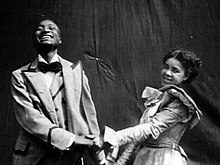Saint Suttle
Saint Suttle | |
|---|---|
 Film still with Suttle (on left) and Brown from Something Good – Negro Kiss (1898) | |
| Born | February 1870 |
| Died | February 4, 1932 (aged 61–62) |
| Nationality | American |
| Occupation(s) | composer, performer |

Saint Suttle (February 1870 – February 4, 1932), was an American composer and performer. Suttle was well known as a cakewalk artist and vaudeville performer in Chicago.[1][2] An African American, he was a pioneering performer in early film of the late 19th-century.[3]
Biography
[edit]Suttle holds hands and kisses Gertie Brown in the short film Something Good – Negro Kiss (1898), made by William Selig.[3][4] It is the earliest known kiss between black people captured on film.[3][5] This example of black intimacy on film was a positive depiction, pushing back against the dehumanizing stereotypes often seen in film in this time period.[5] In 2022, the film was included in the exhibition Regeneration: Black Cinema 1898 – 1971 at the Academy Museum of Motion Pictures in Los Angeles, an exhibition with the objective of showing the contributions of Black artists and filmmakers from the start of the American film industry, that at times pushed against the conventional stereotypes.[6]
Suttle and Brown are pictured on the 1898 sheet music for William H. Krell's "Shake Yo' Duster".[7]
Suttle, Brown, John Brewster and Maud Brewster performed as a group called, "The Rag-Time Four" that was responsible for popularizing a variation of the cakewalk dance.[1] In 1901, one of Suttle's cakewalk performances that toured was called the Coontown 400.[8] He was also involved in developing plans to build a theater that fell through.[9]
Musical compositions
[edit]- "Old Jasper's Cake Walk" published by S. Brainard's Sons[10][11]
- "That Creole Gal of Mine" published by S. Brainard's Sons[12]
- "She's Ready Money" published by Joseph Flannery, Milwaukee, Wisconsin[13]
See also
[edit]References
[edit]- ^ a b "Library Of Congress Honors Groundbreaking 1898 Film Depicting Black Joy: Lulu Garcia-Navarro interviews Allyson Nadia Field". National Public Radio. December 16, 2018.
- ^ "Colored People Want Theater". Newspapers.com. The Inter Ocean (Chicago, Illinois), vol. XXX, no. 49. 12 May 1901. p. 13. Retrieved 2021-11-04.
- ^ a b c Metz, Nina (June 23, 2019). "In Black & White, Chicago Scholar Examines Early American Cinema For Clues To Help Untangle Minstrelsy Woven Into Our Pop Culture". Newspaper.com. Chicago Tribune (Chicago, Illinois). p. 1, 8. Retrieved 2021-11-04.
- ^ Field, Allyson Nadia (2021). "Archival Rediscovery and the Production of History: Solving the Mystery of Something Good—Negro Kiss (1898)". Film History. 33 (2): 1–33. doi:10.2979/filmhistory.33.2.01. ISSN 0892-2160. JSTOR 10.2979/filmhistory.33.2.01. S2CID 236779328.
- ^ a b Bowean, Lolly (4 January 2019). "Recently Discovered Film Clip Shows Historic Kiss From 1898". Newspapers.com. The News Tribune. p. G12. Retrieved 2021-11-04.
- ^ Deng, Jireh (2022-08-19). "Exhibit reveals role of Black Americans in shaping film industry: 'This history has never been shown'". the Guardian. Retrieved 2022-08-19.
- ^ "Shake yo' dusters, or, Piccaninny rag". NYPL Digital Collections.
- ^ "The Elks' Carnival Bulletin, Amusements". Newspapers.com. The Champaign Daily Gazette. 16 July 1901. p. 2. Retrieved 2021-11-04.
- ^ Travis, Dempsey Jerome (October 16, 1983). An Autobiography of Black Jazz. Urban Research Institute. ISBN 9780941484039 – via Google Books.
- ^ Old Jasper's Cake Walk. [Song.] Words and music by S. Suttle. October 16, 1899. OCLC 498821141 – via Open WorldCat.
- ^ "143.033 – Old Jasper's Cake Walk". The Lester S. Levy Sheet Music Collection, Johns Hopkins University.
- ^ "Saint Suttle | Levy Music Collection". The Lester S. Levy Sheet Music Collection, Johns Hopkins University.
- ^ "She's Ready Money, for Voice and Piano by Saint Suttle sheet music on Library".
External links
[edit]- Saint Suttle at IMDb
